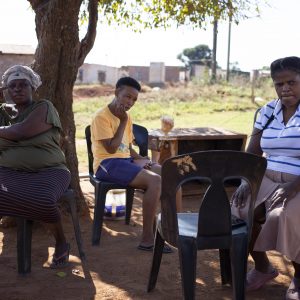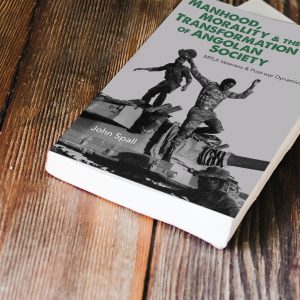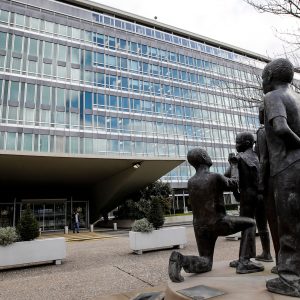New Books | Civil war in the Midlands
Mxolisi R Mchunu explores the violence in KwaZulu-Natal in the 1980s and 1990s that left so many dead and wounded – physically and emotionally.
Author:
28 June 2021

This is a lightly edited excerpt from Violence and Solace: The Natal Civil War in Late-Apartheid South Africa (University of KwaZulu-Natal Press, 2020) by Mxolisi R Mchunu.
An autobiographical narrative
Most of what I describe here did not take place in the public eye. Nor did my experience relate only to the death and suffering of men (talking from a patriarchal society’s viewpoint) who fought heroically to fend off attack in KwaShange. It is also not about prominent men who founded local United Democratic Front (UDF) or Inkatha branches and acted as “warlords” or organised vigilante groups that perpetrated the violence in the area.
But it is rather about sacrifices, emotional agony and its psychological impact on unrecorded victims, who were invariably women and children. It is about ordinary people, who were caught up in a circle of political violence for almost a decade. It is easy for the “outsider” to get the wrong idea about the daily lives of these people, and perhaps pity those who were fighting for survival. This was an unrelenting struggle for life itself, on the part of parents, for their own lives and for their children.
Children of the violence did not understand the genesis of the war. What they knew was gleaned from fearful mothers, from siblings and from actual experiences of hunger, fleeing, hiding and panic. They became orphans or were abandoned. The newspaper reports of the time predicted their identity crisis. My question is: what happened to these children?
Related article:
The violence started when I was eight and only subsided when I was 16. I could be considered “lucky” in having retained my parents, siblings and my home. I survived my experiences, but at what cost? My teenage years were marked by anger and distrust.
There is a second category of “children” of violence – youths (izinsizwa – aged between 14 and 20), who were differently affected: they were instigators, party members, “soldiers”, if you like. Often in the case of war-torn societies, where the conflict has continued or has broken out sporadically for years, these behaviours may eventually become accepted and may be common to large portions of the population and may be considered cultural phenomena.
Research shows that post-conflict societies sometimes experience levels of violence comparable to those in times of civil war. Adam Curle notes, regarding societies torn by civil conflict, that alienation tends to escalate into post-traumatic stress syndrome. Violence generally continues to exist within the social fabric of societies coming out of conflict for decades after the conflict has ended.
Personal experiences of the violence in the civil war arguably affected many people to a greater or lesser degree. This is the inside story of KwaShange, told by two of its survivors, namely, my mother and myself.
Theatre of the mind: Living in a violent era and area
Imagine a domestic worker: my mother, Jabulile Mchunu, who was working for an Afrikaner family in Pietermaritzburg. She came from rural KwaShange, 30km from the city. She worked six days a week, from Monday to Saturday, travelling backwards and forwards daily. It was 4pm, time for her to go home to KwaShange. Her employer gave her a lift to the bus stop at East Street in Pietermaritzburg because walking in the street alone was dangerous. This was where all those who lived in Vulindlela commuted to and from the city. She noticed that only a few people were waiting for buses to go back home.
This had become the norm because people opted to stay at their respective employers’ houses to avoid commuting, and on this day there were very few women. Only people who had to go to town urgently did so at that time. My mother waited for the 5pm bus, which arrived on time. She got onto the bus with a lot of men. These men were forced to return home; there was a war going on and they had to patrol to protect the area at night. They had to relieve those who had been patrolling during the day. While she was still waiting at the bus stop, she heard that many women and children had already left KwaShange and fled for their lives because a message had come that Inkatha would attack the area that same night.
In telling me later, she exclaimed, “Ngaphelelwa asonzwaneni! Ngicabanga izingane zami. (I just lost the little energy I had, thinking about my children.)” My mother was not sure if the bus would reach KwaShange. There were many reasons why this might not happen. Firstly, this bus could be stoned when passing Edendale. Even though Edendale was a UDF-aligned area, it was dangerous to go through, because amaqabane (comrades) stoned any bus that passed through Edendale going to “ngaphezulu” (the outskirts of Pietermaritzburg in the north), as almost all villages described as ngaphezulu were Inkatha Freedom Party (IFP) strongholds.
Related article:
There IFP supporters attacked those who were not obviously of their party. My home area of KwaShange fell under Chief Shayabantu Zondi, who refused to allow his people to become UDF party supporters; hence it was singled out for attack by Inkatha in an attempt to displace those UDF-supporting families. So UDF people in Edendale, in support of KwaShange, would stone buses passing by, even though the bus could well contain people from the latter area.
KwaShange buses would usually be accompanied by an Edendale car to allow them safe passage. In addition, this same bus could be stopped by Inkatha people in Mvundlweni, the area opposite KwaShange, another IFP stronghold. They were known to be merciless killers of UDF supporters. That same morning, my mother had had the experience of being in a minibus that was shot at in Mvundlweni, and the person who had been sitting next to her was injured by a bullet. Many people lost their lives in the Mvundlweni area. And this bus was also in danger because police patrols could think it contained people returning from a rally somewhere – potential troublemakers. The police were known for wasting no time shooting to kill.
Luckily that day my mother arrived home at about 5.45pm. She was safe, but fearful. It was quiet with no people moving around. You could hear a dog barking from afar, but you could see no fire smoke, no one leading a normal life. People had gone to seek refuge somewhere far from the area. Others were hiding. You could hear a whistle as a warning of possible attack – comrades communicating with each other from different parts of the area. Women and children had been instructed to move out of the area, but those who had nowhere to go were hiding.
Related article:
My mother often claimed that throughout this time “the only thing that I was concerned about was my children’s whereabouts”. She would come home only to find the younger children waiting for her arrival. Anything could have happened on her way back home. As the oldest of the three younger children, I would be filled with anxiety for her return. I could not imagine what I would have done without her as some children were left as orphans. “I did not expect to find your older brothers anyway,” she said.
My older brothers had gone. She did not know where they were, but wherever they were, they were patrolling and they had weapons to defend the area from Inkatha attackers as well as from police officers, who often came as part of a “third force”. On her return, my mother would pace up and down, locking the house and surrounding rondavels and preparing herself and the younger children for another night in the nearby forest. Her eyes would be full of tears, but she was not crying. Later, she explained: “I had to be brave because if I showed fear, all of you would cry, and I would not know how to control myself.”
She would tell her children: “Let us go, everything will be fine after all, tomorrow we will sleep in our home and nothing will happen to us.” When my mother said this, I did not understand what was really happening, and I did not know who to talk to because my mother was too anxious. Her body was there but her mind was miles away. I did not know where my father was, but subsequently I realised that he had stayed at work because there was no transport from town to KwaShange.
I was unsure whether to believe my mother’s promises that “things would get better” because she had been saying this for some time, but it never happened. I thought she was not telling the truth and I felt afraid at the time, and later I felt angry. Perhaps I would have preferred to have been told the truth. I loved my mother and I wanted to believe her, even though what she was claiming sounded contradictory to what was happening. Yet, when I did not believe her, I felt guilty and it was like I was betraying her in some way that I could not fully explain.
Related article:
My mother was also anxious about her two elder sons, who were patrolling. She knew that they were angry with her because she worked for the “dogs” (amabhunu or Boers as they were called at that time) who oppressed Black people. The context was the UDF’s policy to make South Africa under the National Party government ungovernable. My mother explained: “The reason why I was so scared was because it had happened to other neighbours, whose children turned against them [parents]; people had gone mad.”
My mother eventually went to sleep in the forest with her three children; her employer had given her three sleeping bags for the cold outdoors. She got up in the morning of the following day, not too early because Inkatha would attack the village at that time of the morning. She eventually left the forest with us children at 4.30am because she had to catch the bus at 5.30am in order to go to work. Her explanation was: “One had to respect the employers because I knew that I would need their assistance one day, so I had to pretend that things were normal.”
She was not sure if she would reach work because the bus might be attacked in the neighbouring Inkatha area. So the stressful journey of the previous day was repeated. She left us children in fear because we were not sure if everything would go well at school. At this time, there were few children at school as many had left the area. It was not a normal situation; teachers we knew were no longer there and our primary school was in danger because it had Inkatha children and UDF children. Each organisation wanted to come and look after its members’ children.
Related article:
One day my mother came back in the afternoon to hear that her uncle, Zakhele Makhathini, had been stoned to death by UDF boys in the area. They accused him of being a spy and having a relationship with Chief Shayabantu Zondi, the Inkatha leader. My mother could not go to see her uncle’s body because she was afraid that she would be killed next. As she locked herself in her room, crying, she heard the news that her uncle’s wife had been killed too. Her aunt had threatened to mention the killers’ names to the police as she knew the people who came to kill her husband, some of whom were relatives.
The aunt’s family had a mentally challenged daughter. She had slept with her parents the whole night because she did not realise that they were dead. My mother’s later comment was, “I remember myself losing my mind, the whole night I could not sleep, and I was shouting, ‘blessed are those who are dead’.” In her anger and frustration, she decided not to go to the forest that night, but to sleep in her own house. She explained: “If I am to die, I would like to die with my children in my house.”
This narrative is but one story of my mother with her children in the area of KwaShange; there are many other women in this and surrounding areas who experienced similar ordeals. I have only described what I saw of my mother then and what she tells me now. This is individual and collective memory, added to my knowledge of historical events in the area.
Others, who were children at the time, told me what they went through in the civil war. When questioned about what they felt about their parents’ states of mind, almost all described their parents as people who had “lost it”. Two sisters described their mother’s condition as “needing psychological therapy”, but other family members described her as being “possessed by spirits” (they thought she was being called to become an isangoma – traditional healer). Others thought their mother was at the initial stage of ukuhlanya (madness).





